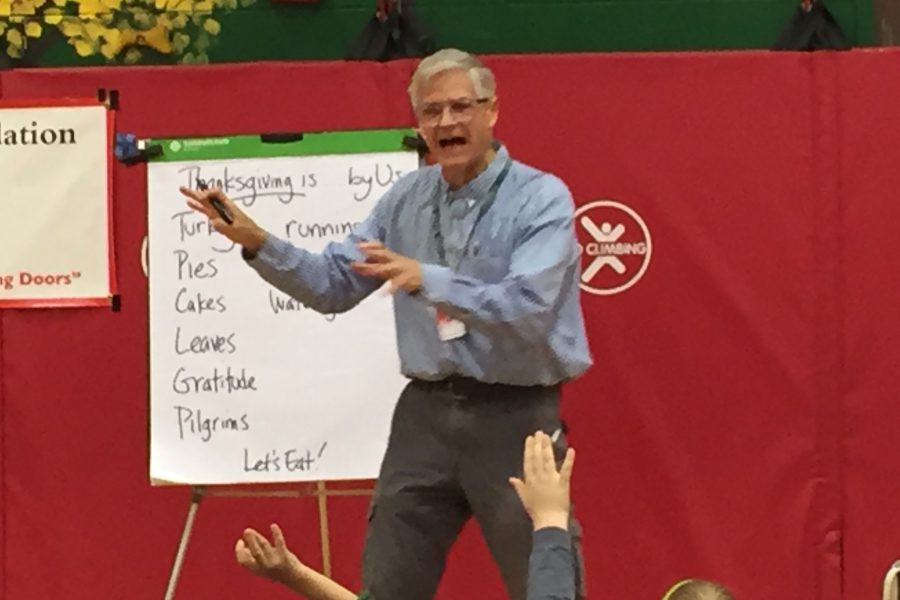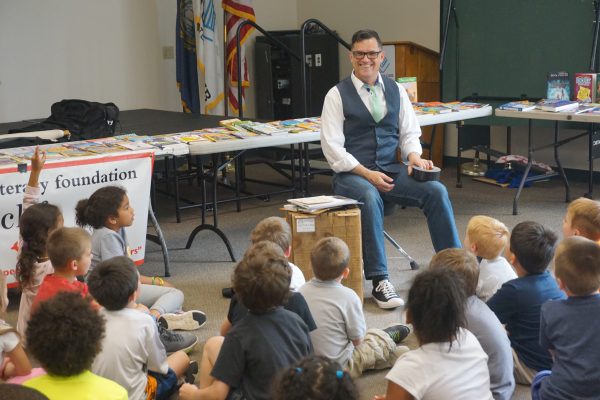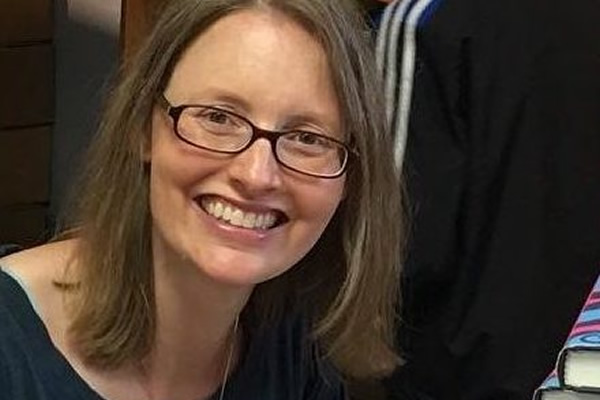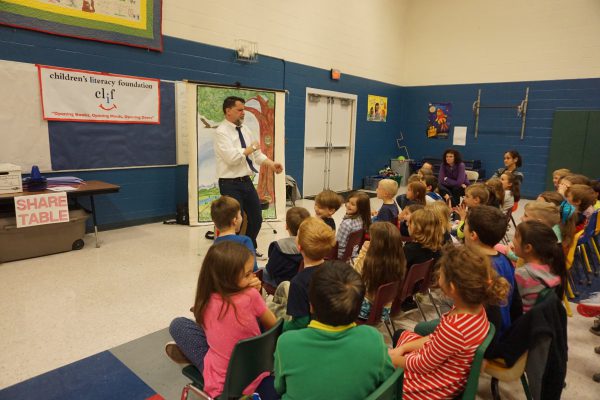
CLiF’s 64 talented and accomplished presenters are a big part of what makes CLiF special. We send these amazing VT and NH authors, illustrators, poets, graphic novelists, and storytellers to places where low-income, at-risk, and rural kids spend time in VT and NH. They share their creative processes and generate kids’ excitement for reading and writing.
Ted Scheu (pronounced “shy”), “that poetry guy,” is the author of six collections of poetry, including I Froze My Mother, I Tickled My Teachers, and I Threw My Brother Out. His poems have appeared in more than two dozen anthologies, including recently in National Geographic Books’ The Poetry of US.
Ted visits CLiF programs, such as our Year of the Book schools, to lead multi-day poetry workshops. His collaborative, imaginative, and silly style make poetry even more fun and accessible for kids. We regularly get thank you notes about Ted’s visits, like these:



We asked Ted about poetry and what he loves about working with kids.
Q. What do you love about writing poetry?
A. For me, writing a poem is a mostly-delightful challenge—a puzzle to solve. It’s often magical the way it unfolds. The late, amazing Ruth Stone, Vermont’s poet laureate from 2007 to 2011, in her mid 90s, wrote modestly about her writing process, “all I do is write them down,” as if the words came unannounced from a mysterious source. Of course, there is much craft and discipline involved, but for me, once I plant an idea in my head-garden, it seems to often magically grow with a little dedicated love and watering from me. The endings of my poems, especially, often surprise me, as I hope they surprise my readers. With rhyming, rhythmic poems, like most of mine, there is the ever-present and delightful challenge of putting ideas and words into a smooth and bouncy form. I tell kids that I love the juggle of revising poems, to find that surprise and bounce. Then, sharing a poem aloud and watching smiles grow and eyes widen is the ultimate pay off.
Q. Why do you think it’s important for kids to learn about poetry? What do you hope they get out of it?
A. Kids often find themselves—their lives, their hearts, their gifts—inside poems, whether they are reading someone else’s verse, or especially if they are writing their own. Poetry is a form, by virtue of its brevity and flexibility, that kids find less intimidating. And because it is short, it gently and clearly demands that the writer choose her words super carefully. Every word counts. Poems also encourage imagination, with strong, surprising figurative language and images. And it also fosters the expressing of important truths and feelings right from the heart. As such, it is a great way for young writers to see and experience the importance of ‘showing’ and not ‘telling’ their truths and feelings. In short, poetry helps kids find their writers’ voices. That’s my experience, and it’s wonderfully gratifying to watch it unfold.
Q. What do you enjoy most about working with kids?
A. Working with kids fills me with nearly complete joy. I love their openness, their kindness, their willingness to dive in and share their hearts in a poem. I also find that a school setting not only keeps me young, but also serves as a great testing zone for my poems, and provides me with an endless source of ideas, if I only open my ears, eyes, and heart when I’m among children. I literally could not write my poems without the infusion of ideas, inspiration, and energy and I get working and giggling with kids in school visits.
Q. Are there any stories from CLiF poetry workshops you’d like to share? Any memories that stand out?
A. I visit over 60 schools each year around the country, but working with the 4-6 CLiF schools I visit each year is by far the most gratifying work I do. I’m deeply honored and lucky that CLiF provides that chance for me. CLiF schools deeply appreciate the gift that their grant offers them, so they work to make the most of it. Do I have a favorite CLiF memory? Too many to highlight. OK, one does stand out, although this specific experience replicates itself often.
I was working at a small, west-central Vermont school about 10 years ago—a three-day residency. The teacher warned me that a particular sixth grade boy in her class hated writing and hadn’t produced much all year. We wrote short, list poems that day—on any topic—just a title, 5-6 nouns and verbs (powerful, surprising verbs) and a final closing line. The boy in question was from a farm family and his life was completely absorbed by farming, hunting, and four-wheeling. That first day he wrote not one but two list poems in 10 minutes, and then on the subsequent two days, while the class and I moved on to other poetic forms, he kept writing short, amazing list poems, about every aspect of his life. By day three he had probably produced 10-12 wonderful poems which astounded his teacher, and for which he was justifiably proud. This sort of thing happens with poetry and kids all the time. Often the struggling writers are those who are most attracted to it. It’s magical. Have I said that already?
Q. Why do you think programs like CLiF are important? Why does literacy matter in today’s world?
A. CLiF is a literacy lifeline for many kids, especially those for whom literacy learning hasn’t been prominent or even visible in their home lives, for whatever reason. Seeing eyes light up like twinkling stars during CLiF book giveaways is a total treat. And through writing workshops and exposure to a variety of artists and writers, CLiF also provides, hopefully, a lifelong spark, showing kids the importance of literature and thoughtful creative writing in their lives—all leading, I hope, to more thoughtful, open-minded, young leaders who will be taking care of me when I’m 90.
Q. Do you have any recent or upcoming projects you’d like to share?
A. What’s upcoming… I look forward to doing at least four CLiF writing programs in 2019–maybe more. As for my own work, I have three poetry collections in the works. And I’m very proud to have two poems in a remarkable new National Geographic Booksanthology that celebrates American poetry and culture called, “The Poetry of US.” I keep busy!
Q. Is there anything else you’d like to add?
A. What else would I like to add? My thanks to you for reading this far, and for your support, in whatever way you can and do, to the spectacularly important work that CLiF does. And my thanks, again, to Duncan and the CLiF team for the awesome honor of being on ‘the team.’ Let’s all keep up the fine work of sharing literature with kids and helping inspire them to grow strong, and find their gifts and voices!



